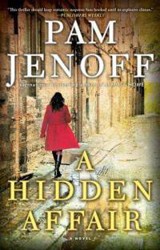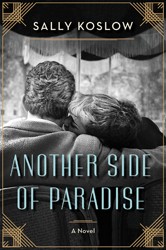Zoë Heller’s third novel describes the career, marriage, and family life of Joel Litvinoff, a 60’s activist who has become a famous radical lawyer. When Joel is incapacitated by a stroke, a secret about his life is discovered. Audrey, Joel’s wife for forty years, has devoted herself to him but now must face reality and figure out her next move. Meanwhile, the couple’s three children are finding themselves as well. Rosa, the oldest, has similar principals to her parents, including a distaste for religion, but now she is searching for something more from her own Jewishness. Karla is unable to admit that her marriage is flawed until she gets a glimpse of happiness elsewhere. Adopted son Lenny is immersed in drug abuse and dependency on his mother. This is a quick read about interesting characters who will seem familiar to anyone who has read about or lived through that era.
Miriam Bradman Abrahams, mom, grandmom, avid reader, sometime writer, born in Havana, raised in Brooklyn, residing in Long Beach on Long Island. Longtime former One Region One Book chair and JBC liaison for Nassau Hadassah, currently presenting Incident at San Miguel with author AJ Sidransky who wrote the historical fiction based on her Cuban Jewish refugee family’s experiences during the revolution. Fluent in Spanish and Hebrew, certified hatha yoga instructor.
Discussion Questions
Courtesy of HarperCollins
1. Why does Joel Litvinoff propose marriage to Audrey Howard after their first date, and what does his doing so suggest about his character? How typical (or atypical) is their relationship for a couple married some forty years?
2. In what ways does Audrey feel both more and less powerful in the aftermath of her husband’s stroke? How does her behavior toward Joel’s colleagues at the hospital compare to her behavior toward her children?
3. How does Rosa feel about her involvement with the girls in East Harlem’s Girl Power? To what extent is she an advocate for them? Does her awareness of race and class differences between her and the girls affect her professionalism?
4. How does Karla and Mike’s inability to conceive a child after several years of trying affect their marriage? What accounts for their disparate feelings about the possibility of adopting a child?
5. Why is Karla open to a friendship with Khaled after he insults her by asking directly about her dieting? To what extent does Khaled’s indulgent, unselfconscious attitude toward food enhance his appeal in Karla’s eyes?
6. How serious is Rosa about becoming an observant Jew? What threatens the possibility of her complete conversion?
7. What does Berenice Mason’s desire to get to know the Litvinoffs suggest about the nature of her intentions? Which sister has better insight into Berenice’s motives — Karla or Rosa?
8. How does the backdrop of the 9/11 attacks on New York City color the fictional landscape of The Believers? To what extent do you perceive a generalized anxiety in the world inhabited by the characters of this novel?
9. What role does Lenny’s trip to Bucks County with Jean play in his development and rehabilitation? Why isn’t Audrey more supportive of his transformation, and of Jean’s role in it?
10. What does the scene at the end of the novel suggest about Karla’s future? Why do you think the author chose to close with this character, at this moment of her life? How did this closing scene affect your appreciation of The Believers?





